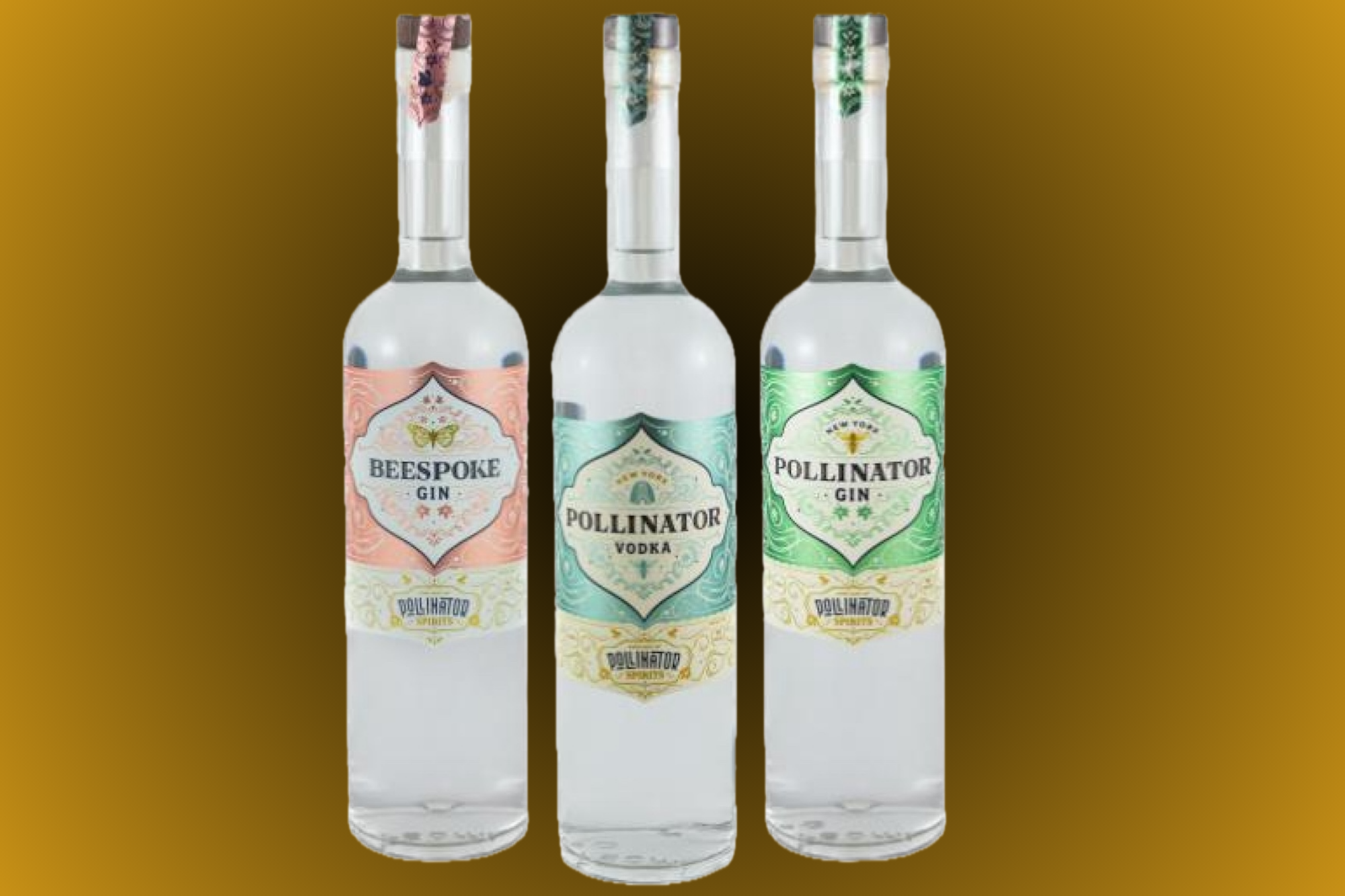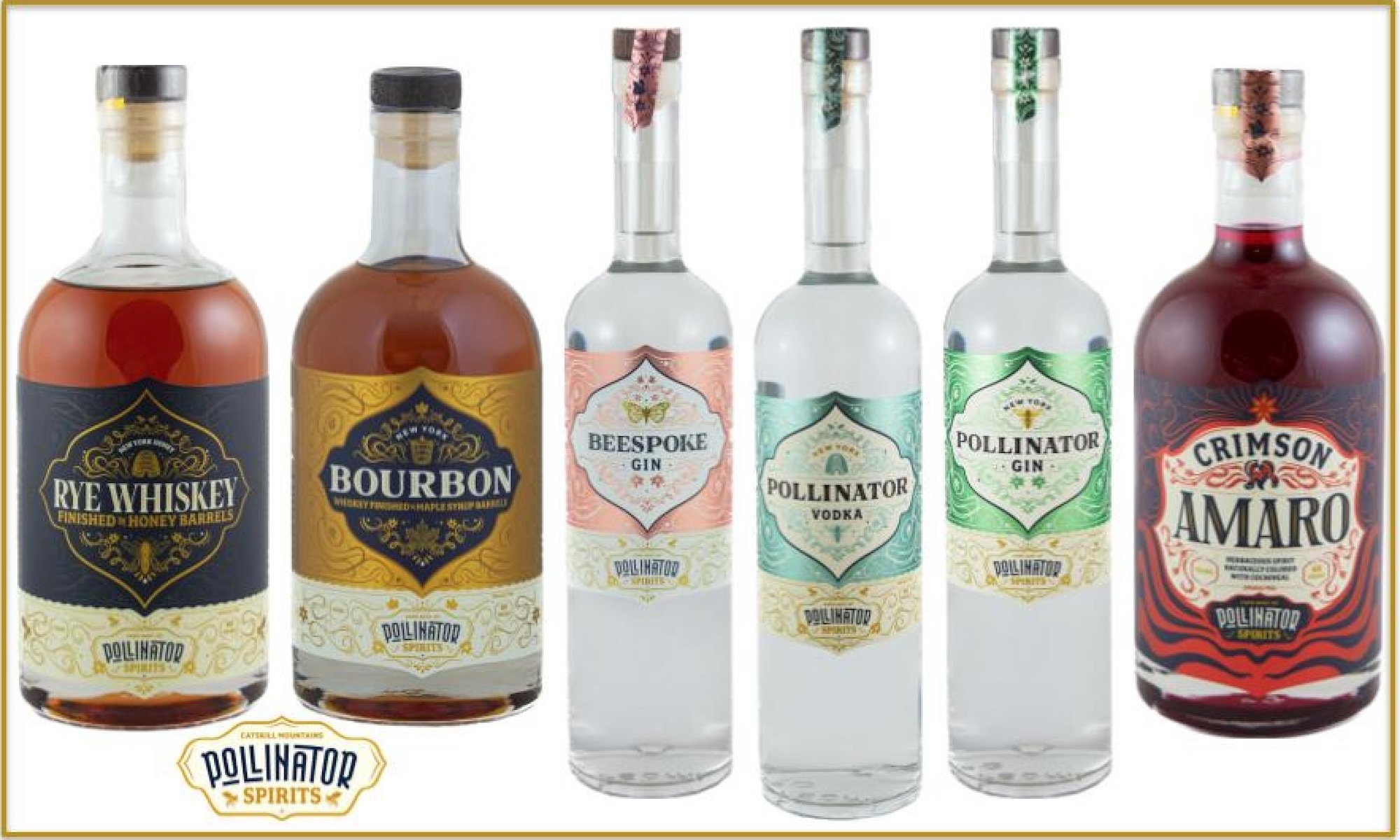All the Buzz on Pollinator Spirits
Claire Marin of Pollinator Spirits photo credit @maxb.photo
“I’m a little bit of a renegade within the world of distillation because I have my own way of doing things,” says Claire Marin, founder and CEO of Pollinator Spirits. “My goal was always to be original, individual, and creative.”
She’s succeeding. Pollinator Spirits, which produces a slate of liquors including whiskey, gin, and amaro, is distinguished by Marin’s unconventional use of honey in her production and aging processes, resulting in spirits with softened, rounded edges. That makes her Pollinator Vodka unusually sippable with less of the traditional flavorless qualities usually associated with vodka. Pollinator Gin, distilled with wildflower honey, makes a seriously smooth gin and tonic.
“I think it does affect the mouthfeel of my spirits, and what’s in the bottle,” says Marin. “To a creative person who loves food and beverages, I think it is fascinating and exciting,” shares Marin. “Taking a solid and turning it into alcohol, the chemistry of it is just wondrous,” she adds. “It’s really incredible how much your tweaking of that initial mash can affect taste and texture.”
Connecting Conservation & Creation
The beekeeper-turned-distiller took a circuitous route to her current career. She was an oil and then commodities trader at Hess Oil and the publisher of magazine mainstay Woman’s Day at publishing powerhouse Hachette Filapacchi before becoming a beekeeper. She credits the bees for her foray into distilling.
Pollinator Spirits
Twenty years ago, Marin began beekeeping at her weekend house to balance her self-described “crazy life.” The experience wound up being inspiring and life changing. “It opened my eyes and my soul, really, to the natural surroundings up in the Catskills and being closer to nature,” she says.
It also led to a desire to protect the land in her area of the western Catskills which was vulnerable to fracking interests and to support agriculture and the dairy farmers who were losing their businesses.
In 2010, Marin decided to step off the corporate hamster wheel, a major reckoning for her, leaving behind her high-powered corporate businesswoman identity. She turned her beekeeping hobby into a business supplying well-known New York City restaurants like Marc Meyer’s Cookshop and became involved in Chefs for the Marcellus, a group of New York chefs who successfully fought fracking efforts in upstate New York. Armed with her newfound awareness, knowledge, and natural business acumen, she recognized that rye, which grows beautifully in the area, could offer a new crop and diversity to farmers. Perhaps she could provide a market for the rye so farmers would not feel compelled to sell their land.
Claire Marin photo credit @davidwhitestudionyc
Using Honey in Craft Distilling
Women’s interest in the whiskey world was a whisper at the time and Marin thought she could make a mark there while underlining the importance of food versus selling out to corporations. Craft distilling in New York was still in its infancy; only Tuthilltown Spirits was up and running.
She immersed herself in whiskies, reading, taking classes, and experimenting in her kitchen with bourbon and honey and bourbon and maple. Finding many of the ryes she was tasting “really harsh, hard to love” with high ABVs, Marin, noting the natural honey notes in rye, started adding honey to it, very simply, and discovered she loved how it softened the jagged edges.
“To this day now we finish a three-to-four-year-old rye in barrels that I have coated with a very little amount of honey so it’s really more of an aroma and a mouthfeel that you’re getting from the honey,” she says.
Marin also discovered that she felt right at home crafting spirits. Born in Madrid and raised in Brazil and the United States in what she calls “a European household” with a French father and Spanish mother, and speaking three languages, she recalls gathering around the table, cooking, sharing, and connecting with friends and family. “Getting my hands in there, the smells, textures, sounds, temperatures, all those things are very similar to cooking to me, so I feel extremely comfortable in making my mash and fermenting,” she says.
Marin settled on using a spicy, complex, fall honey for her rye and worked with other distilleries to perfect and produce it. Pollinator Spirits’ Honey Rye launched in 2013 and has won awards and a following since. Wanting control of her product – “It’s hard to make Pepsi at the Coca-Cola plant,” says Marin -- she decided to strike out on her own in 2018, building the distillery on her Long Eddy property and a tasting room in nearby Callicoon under the auspices of Catskill Provisions Distillery. The vodka and gin came next. (The company also produces the provisions, which include honey, truffles, and condiments like ketchup.)
Facing some of the same difficulties fellow female distillers have encountered in seeking financing, Marin self-funded the company and continues to do so. As a female business owner and member of LGBTQIA she hopes to continue to mentor women interested in entering the field and foster an inclusive industry, perhaps via an internship program.
Going Local
Pollinator spirits line
Pollinator products are true small-batch expressions of terroir. Marin uses only local, non-GMO corn and rye, no additives, and distills sustainably, donating spent grains to local farmers and a portion of profits to a variety of pollinator causes. She rests all her spirits after proofing them with well water from her 40-acre property in Long Eddy, NY. Though she’d been advised to use distilled water instead, she’s been delighted with the outcomes. Honey is added to yeast to add flavor and produce better yields. Two beekeepers help care for up to 300 area hives.
Looking Ahead
Commemorating the company’s tenth year by bringing Pollinator to the fore of the business, Marin will focus on developing programs at bars and restaurants for what she calls her lead spirits: the honey rye, gin, and the line’s newest addition, a crimson amaro, because she loves their versatility in cocktails. Pollinator Spirits are now also available for purchase directly to consumers through its website.
Marin marvels at her evolution to founding, growing, and sustaining a spirits business that she’s centered around healthy bees, the land, and sustainability, delighted she’s been able to bring together her passions in this unique way. She says opening a beehive was an incredibly alluring, mesmerizing experience that connected her to a world she hadn’t seen before on this planet. “The moment I opened my first beehive,” says Marin, “I never looked back!”




